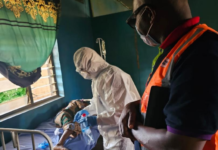Dr Gambo Aliyu, the Director-General, National Agency for the Control of AIDS (NACA) said the importance of people identifying the various modes of HIV transmission cannot be overemphasized, as it is the key not only to controlling the risk of contracting and spreading the virus but can help in achieving zero HIV transmission in the country.
Aliyu said this in Abuja on Monday while delivering a lecture on the topic ‘Mode of HIV Transmission’.
He outlined four risky groups within the population, which include: never married males, never married females, men who have sex with men and female sex workers,
The NACA boss, who expressed the commitment of the Agency in achieving the 95-95-95 target by the year 2030, said the study would help stakeholders to focus attention on the risky populations.
According to him “Time is running out for us in achieving the 95-95-95 target for 2030 but this study will help us to know where to invest resources in tackling transmission.
He said, “There is no way we can prevent new infections or control HIV transmission without identifying those areas that trigger new infections”.
Presenting the study, Mr Tosin Adebayo, the Chief Programme Officer, Research, Monitoring and Evaluation of NACA, said the largest number of new infections was among never-married females and males.
Adebayo said that men who have sex with men, female sex workers as well as never-married females and males account for 91 per cent of new infections among adults
He added that new child infections due to mother-to-child transmission represent the second-largest source of new infections, accounting for 22 per cent of all new infections.
The programme officer noted that the distribution of new infections varies from state to state, saying that a larger proportion of new infections occur among never-married individuals or in zero-concordant negative couples.
He explained that antenatal care was vital in reducing new infections, especially mother-to-child transmission.
“Most of those women who do attend antenatal care get tested for HIV but more than 60 per cent of pregnant women do not attend.
“Increasing antenatal care attendance would have benefits not only for reducing HIV transmission but also for the overall health of the child and mother.” He added.
Follow the Neptune Prime channel on WhatsApp:
Do you have breaking news, interview request, opinion, suggestion, or want your event covered? Email us at neptuneprime2233@gmail.com





